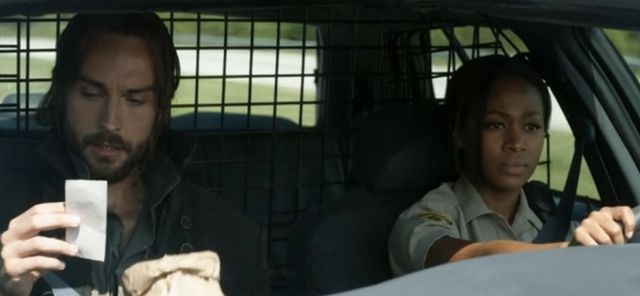
Having finally seen Luke Cage, it’s safe to say that it’s some of the best work Marvel has done on-screen, be the screen big or small. It just edges out Jessica Jones as my favorite of the Netflix seasons so far. Both Daredevil seasons average out to being, ironically, above average, and Jessica Jones is one of the most powerful and necessary works of fiction put on television in a long time. But it’s a hard watch, a grueling emotional experience, and I don’t know when I’ll be ready to watch it again.
I’d start watching Luke Cage again at any opportunity. It’s just… it’s so good.
Part of what makes it good is its message. Luke may be super-powered, with bulletproof skin and super-strength, but he strives to be ordinary. He wants a quiet life, to be left to his own devices. He could easily market his skills or pursue a life with the Avengers, but we see him working two jobs to afford a small apartment in Harlem. Like any of us would. And when trouble arises and touches those he cares about, he stands tall. Like any of us should.
I took particular note of the differences between Luke and his adversaries. He neither wanted nor encouraged anyone to speak up on his behalf, to engineer end-runs around his foes, to spread rumors or anything underhanded. He went after them himself. He faced them on his own terms. He hit them where their treasure lies, he hit those treasure vaults hard, and when they called him out, he looked them in the eye and spoke his mind, right before, in his words (and those of the Wu-Tang Clan), bringing the motherfucking ruckus.
Luke Cage’s world is our world, a world of selfish schemes, corruption, and violence. I’ll get into some of the greater societal messages when I talk about that world and its reflection upon us, but for today, there’s something about Luke Cage that spoke directly to me, loud and clear.
The through-line of Luke’s narrative is the nature of standing tall.
“You have to fight for what’s right every single day, bulletproof skin or not,” Luke says in the finale. “You can’t just not snitch, or turn away or take money under the table because life has turned you sour. When did people stop caring?”
There are people in this world, too many people, who seek opportunities to get themselves ahead. They may see it as serving some greater good; they may be proceeding from a false pretense or a basis of false facts; they may simply want to make themselves more powerful or more attractive. We live in a world where the art of deception has become the art of distraction, of presenting rumors as facts, of manufacturing drama to pull attention and critical thinking away from the truth of a matter and giving power to conjecture. All too often, people involved in these situations, even good people with good hearts, are swept up in the tide and the circus-like atmosphere of the bandwagon, and opt for towing the line of group-think, even re-writing their own history and thoughts to fit a more pervasive narrative.
It’s not just a driving plot device in a fictional work like Luke Cage. It’s something that happens every day in reality. I’ve seen it. I’ve even been a part of it.
In my life I’ve run across way too many Cottonmouths, way too many Diamondbacks, and way way too many Mariah Dillards. We need more Misty Knights, and Claire Temples, and men like Bobby Fish and Pop. Men like Luke Cage.
It isn’t easy to stand tall. You may feel like you aren’t ready to do it. You may be scared to look for the facts and speak up on their behalf. When the pitchforks get distributed, and the propaganda machine spins up to power, and the gaslights begin to glow with their infernal illumination, it’s easier and safer to duck and cover. It’s a lot harder to stand tall.
But as much as I’ve seen people reveal their ugliest or most terrified or disappointingly two-faced natures, I’ve seen others do just that. Do the hard thing. Stand tall.
It didn’t matter if they had to reach out across a scorched bridge, or resist the restrictions of a problematic spoon-depleting health condition, or just look at the rolling juggernaut-like bandwagon and refuse to hop aboard. They went after facts. They held their own viewpoints without being colored by hearsay or shocked into silence or backpedaling. It wasn’t easy for them, and I deeply appreciate it. They humble me, inspire me, and propel me to continue being the best version of myself possible, every single day.
I am done turning myself down or making myself smaller in misguided attempts to make room for others. I’m going to keep standing tall.
After all, if you were to ask Luke when the time is to stand tall, he’d say one word.
“Always.”
Tuesday are for telling my story.




